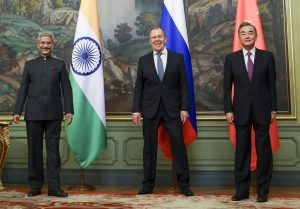In a landmark development last week, Beijing proposed a visit to New Delhi by Chinese foreign minister Wang Yi toward the end of this month. Wang will be on a pan-South Asian tour and China has reportedly asked India if it would host him.
India has so far been non-committal on the proposal and the short notice may well scuttle the visit. But Beijing’s decision to propose such a visit — the first in the aftermath of the 2020 Galwan clashes between India and China — is significant all the same.
For several weeks now, China has had an opportunity to reach out to India in the midst of a growing gap between Washington and New Delhi. That gap has only become wider with the conflict in Ukraine, where India and China have made similar comments, combining a quiet discomfort over Russia’s unilateral invasion with an extant and growing skepticism of the West.
At Quad meetings, India has repeatedly broken line with Japan, Australia and the U.S. and held back the coalition from denouncing Russia for its invasion. More recently, India has begun publicly courting cheap Russian oil, which is looking for new buyers amidst the standoff with Western Europe. So far, in March, India has imported nearly four times as much Russian oil as it did each month last year.
Despite India’s heavy reliance on imported fuel, less than 5 percent of its oil has typically come from Russia. That makes India’s overtures all the more significant. It’s one thing to quietly ramp up the purchase of Russian oil and quite another to do it aggressively during Moscow’s bombing campaign in Ukraine. In response to criticism from the White House, New Delhi lashed out, arguing that “countries with oil self-sufficiency … cannot credibly advocate restrictive trading.”
Under the circumstances, India is fast becoming an unlikely ally for both China and Russia, and more than at any time in the past, President Xi Jinping has a huge opportunity to embrace New Delhi and drive a wedge between India and the West.
For all the talk of China as a common threat, India doesn’t appear to care about most of what concerns the U.S. So far, it has expressed no position on Taiwan, Xinjiang or China’s efforts in replacing the U.S. as a leader in global economic governance. For India, tranquility on the border with China is the primary and — arguably — sole objective.
That position has been made clear in multiple official statements. As recently as last week, Indian Foreign Secretary Harsh Vardhan Shringla told China that “peace and tranquility in the border areas are essential for the development of our relationship.” New Delhi is skeptical that the U.S. will be willing to help India on this issue without eliciting commitments elsewhere — whether in Asia or Europe.
Unease continues to fester over the border, but dialogue goes on. Owing to multiple rounds of talks, India and China completed their disengagement process around the sensitive Pangong Lake last year. Earlier this month, the two countries held a fifteenth round of talks to resolve pending issues in eastern Ladakh. Prior to that, Wang admitted that the setbacks caused by the border flare-up did not serve the fundamental interests of the two countries — a rare show of rapprochement from Beijing on the border dispute.
Up until the Ukraine war, China had been slow to pick up and exploit India’s growing divergence with the U.S. on global norms and values. Late last year, amidst the West’s diplomatic boycott of the Beijing Winter Olympics, India initially joined Russia in backing China’s role as the host. But that position had to be reversed when China decided to feature a veteran of the Galwan clashes in its torch relay — an unprovoked self-goal by Beijing.
This recent exploration of a meeting in New Delhi, however, may be a sign that China is finally waking up to a huge strategic opportunity to pursue a thaw with India.
Domestic politics will also help. Thumping wins in recent state elections have further strengthened Prime Minister Narendra Modi’s hand and will make reconciliation with Beijing politically possible, despite New Delhi’s memory of the clashes in Ladakh two years ago. Meanwhile, Xi is set to seek an unprecedented third term as Chinese president later this year.
With Russian President Vladimir Putin raising the stakes of a confrontation with the West, Beijing may well see India as a useful partner in the global geopolitical game.

































